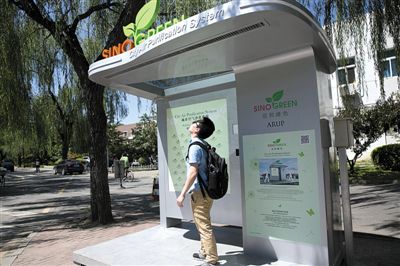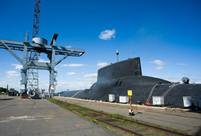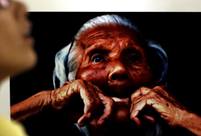

 |
| A student breathes "clean air" at a bus-stop shaped air-purifying device in Tsinghua University. (Photo/Beijing News) |
An air-purifying device shaped like a bus stop has been installed at Tsinghua University in Beijing as part of a pilot trial.
The device was tested for four months in downtown Hong Kong before being moved to Beijing on Wednesday. It can get rid of 30 to 70 percent of PM2.5 (airborne particles smaller than 2.5 microns in diameter) and PM10 in the air, depending on the severity of real-time air pollution.
On its first day in Beijing, the device reduced the PM2.5 density around it to 1 microgram per cubic meter, considerably lower than the 20 micrograms per cubic meter present in the area.
It took seven months and more than 600,000 HKD (about $77,400) to develop the device, which serves not only as an air purifier, but also as a bus stop. Experts say the construction cost would be significantly lower if air purifying systems were added to existing bus stops instead of building new ones.
The air purifying system allows air to enter the device at the bottom and exit at the top. As the air travels through the bus stop, air purifying structures in the middle remove much of the pollution.
Thanks to hydromechanics, the device also maintains positive air pressure over its surroundings, extending a "shield" of clean air to protect whoever stands within it.
If this version of the "oxygen bar" performs well in its trial run, future versions will be tested in other crowded areas in Beijing.
 Creative graduation caps of ‘vigorous elves’
Creative graduation caps of ‘vigorous elves’ Hong Kong in lens
Hong Kong in lens Typhoon class strategic Submarine in photos
Typhoon class strategic Submarine in photos Hong Kong college students feel the charm of Hanfu
Hong Kong college students feel the charm of Hanfu Japan’s crimes committed against "comfort women"
Japan’s crimes committed against "comfort women" Odd news:“carrying a rod and asking to be spanked”
Odd news:“carrying a rod and asking to be spanked” Legendary life of a bee-keeping master in Hainan
Legendary life of a bee-keeping master in Hainan 4-year-old cute 'monk' spends summer holiday in temple
4-year-old cute 'monk' spends summer holiday in temple College graduates shining on the red carpet in Nanjing
College graduates shining on the red carpet in Nanjing Pledging allegiance reinforces Constitution
Pledging allegiance reinforces Constitution  Market falls amid fears about unregulated margin lending
Market falls amid fears about unregulated margin lending  Mass wedding for North Korean defectors held in Seoul
Mass wedding for North Korean defectors held in Seoul  Orthodox Church sees opportunities in China following enhanced Sino-Russian ties
Orthodox Church sees opportunities in China following enhanced Sino-Russian tiesDay|Week